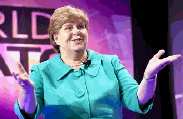
Typical street scene in Santa Ana, El Salvador. (Photo: iStock)
IMF Survey: Cooperation Key to Secure Recovery, Say Expert Panelists
October 14, 2010
- Global cooperation needed for growth
- Balance of cutting and spending difficult task
- Crisis will create changes in global financial system
A renewed commitment to global cooperation will be the key to the economic recovery and financial stability, experts said at a conference on the sidelines of the IMF-World Bank Annual Meetings.

BBC Global Debate panelists, left to right: Stiglitz, Rohmer, Papaconstantinou, Strauss-Kahn, Xiaochuan (photo: IMF)
IMF ANNUAL MEETINGS
Discussions on a range of topics, from growth and jobs to government spending, were hosted by the IMF as part of its Program of Seminars in Washington, D.C. on October 8.
IMF Managing Director Dominique Strauss-Kahn said countries had to respond to the crisis according to their own circumstances, and in the medium term fiscal consolidation was needed. But there was no point in economic growth if it does not provide people with a livelihood. Strauss-Kahn said the most important challenge right now was to restore jobs.
Governor Choongsoo Kim of the Central Bank of Korea identified two priority issues: “ways to achieve sustainable and balanced growth”—referring to the agreement between leaders of the Group of Twenty industrialized and emerging market economies in Pittsburgh in 2009—and “ways to prevent another crisis.”
The Program of Seminars provided a forum during the Annual Meetings for the private sector, government officials, civil society and staff from the IMF and World Bank to find solutions to the most pressing issues facing the global economy.
Coordinate globally, act locally
Reflecting on the role of growing economic linkages between economies in the crisis, IMF Special Advisor Min Zhu stressed that cooperation is the answer.
“Obviously this is a governance issue because if everybody is linked to each other, then we need everyone to take the same [policy] action … otherwise it won’t work.”
“The only solution of course is to have some sort of renewed spirit of cooperation, but we tend to speak globally, but act unilaterally,” said Guillermo Ortiz, former Governor of the Bank of Mexico.
Wary of the countries’ defensive policies given imbalances in the global economy, George Soros, another of the high profile panelists, was also skeptical.
“Countries unanimity was driven by fear, but the fear has dissipated and the differences of opinion have become sharper, and there is this debate of fiscal rectitude or the need for cyclical stimulus,” he said during the debate at the IMF on Global Economic Governance.
Stimulate or consolidate
The question of whether countries should stimulate their economies further or cut their budgets was debated by top names in economics and finance at the IMF’s BBC World Debate, Stimulate or Consolidate: How to Secure the Global Recovery, recorded on October 8. The answer: “It depends.”
Greek Finance Minister George Papaconstantinou, one of the five panelists, said his country had “no choice” but to trim its government’s budget in the face of an acute crisis.
But Nobel economist Joseph Stiglitz said, unlike countries such as Greece, the United States needed to continue spending to support its economy.
“The U.S. does have access to the markets, we can borrow, and therefore, because we have a choice, we have no choice - we ought to be stimulating,” he said.
Stiglitz’s view was echoed by Christina Romer, until recently the chairwoman of the Council of Economic Advisors to United States President Barack Obama.

Christina Romer backed further stimulus (Photo: IMF)
“Countries that do have a choice have an obligation to be helping those countries that don’t,” she added. In the case of the U.S., the world’s largest economy should “stimulate more and we also need to consolidate,” she said.
“We need to have a long-term plan for getting our deficit under control, and that would make stimulus work better now,” said Romer, adding later in the debate “this is still a crisis.”
In another of the IMF-hosted seminars, top academics and finance ministers from South Africa and Estonia joined Carlo Cottarelli, head of the IMF’s Fiscal Affairs Department, to hash out the when, how and why of government deficit reduction and debt accumulation.
The panelists said the focus should be on the quality of spending, which in tough economic times needs to focus on investments in a country’s sustained growth, such as education and infrastructure. Alberto Alesina, a professor at Harvard University said infrastructure spending in Europe isn’t useful.
The group said countries are doing the right thing for their economies, which varies across and within regions, and between advanced and emerging economies. All face the difficult task of finding the right balance of cutting and spending.
“This is a goldilocks world, and we need to do this just right,” said Cottarelli.
Global imbalances will take time to fix
The persistent imbalances between the world’s economies and the risks to economic stability were recurring themes in the various seminars, including the Future Global Financial and Monetary System.
Michel Camdessus, former IMF managing director, said he didn’t “believe we will get rid of these imbalances soon.”
There is now momentum to deal with many of these systemic problems in the international monetary system according to the IMF’s top policy official, Reza Moghadam, who was a panelist alongside Camdessus.
“Traction to discuss issues of the international monetary system or capital account issues was not there before the crisis.”
Among these issues, one drew the most attention - ballooning foreign exchange reserves and defensive currency moves by some countries, which has been the subject of fierce public debate in recent weeks. Also high on the agenda for the panelists was the question of how emerging market economies should manage the ‘tidal wave’ of capital.
On the Chinese currency, Zhou Xiaochuan, Governor of the People’s Bank of China and one of the five BBC World Debate panelists, said Beijing was committed to a slow, gradual path to a market-based exchange rate regime.
“The difference for China is that we do this in a gradual way, instead of shock therapy.”
On the role played by capital controls, Ortiz was not a supporter.
“At best, this works on a temporary basis, or worse they don’t work at all or they are counterproductive.”
On the other side, Bank of Israel governor Stanley Fischer encouraged the IMF to continue to work on this issue with the hope that, in time, a consensus could be built.
A forum for debate
While there was no closure on many of these hot topics, panelists welcomed this opportunity for debate. Soros went so far as to point to the IMF as “a forum for more innovative thinking- because there is more discussion here than in other fora.”
But risks to currency markets, the sustainability of recovery, and capital flows into emerging markets remain.
“I’m more worried than I have been in quite a while,” said Barry Eichengreen panelist and professor at University of California at Berkeley. “So, if there was a good time for the Governors of the IMF to meet … and decide what to do about this, one can’t think of a better moment.”







